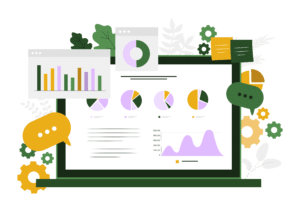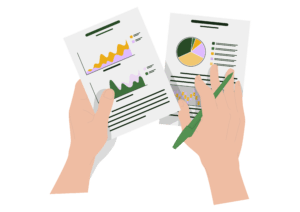
Everything you need to know about sustainability reporting
For any organisation looking to bolster their environmental and social credentials, sustainability reporting needs to become a priority.
Being able to shed light on the complexities of an organisation’s daily operations and supply chains can help improve profitability, efficiency, and sustainability. Annual reports that clearly communicate a company’s environmental and social performance helps to engage stakeholders, employees, investors, and customers. It also helps to identify areas of improvement as well as presenting an opportunity to celebrate successful milestones.
With so many data points within a business, the sheer volume of data can soon become overwhelming and the ability to communicate the effectiveness of any sustainability efforts can be lost.
Luckily, there are solutions to transform vast amounts of data into meaningful conclusions, helping to influence decision making and make the reports much easier to digest.
In this article, we outline what is meant by the term sustainability reporting and how to use them effectively to achieve business results.
What is sustainability reporting?
Sustainability reporting is the process of evaluating the performance of a business’s impact on people and planet. It helps to provide some context, both internally and externally, as to how a business is doing against their own targets and goals, as well as industry standards (and even regulations).

The interest in Environment, Health & Safety (EHS) reporting, as part of wider corporate sustainability goals, has grown over the last decade or so, aligning with the overall interest in global environmental and social issues. As consumers become increasingly aware of the impact businesses have on the environment (both positive and negative), there has been demand for increased transparency in supply chains and business operations. Businesses that can demonstrate they are having a positive impact, are undoubtedly seen as more favourable in any marketplace.
Sustainability reporting also helps demonstrate compliance with government regulations on things such as waste, emissions, and environmental impact. For certain companies, this is a must and failure to do so can be significant. This is particularly important for companies dealing with hazardous materials or that work very closely with the natural environment.
Some industries may have their own standards and expectations when it comes to sustainability, so annual reports help illustrate a company’s performance against industry benchmarks. There is growing interest around public traded companies to be transparent about their environmental and social impact.
Several initiatives, such as GRI, help to standardise sustainability reporting and make it accessible for businesses of any size or sector. This provides benefits in being able to compare companies and remove internal biases. Following such guidelines helps businesses create reports that are structured in a similar way, to make comparable analysis and interpretation much easier and efficient.
Sustainability reporting trends
Becoming net zero and minimising waste have become increasingly common across sustainability reports in recent years. These targets reflect government ambitions and the global challenges that need addressing.
In such contexts, the value of sustainability reports becomes clear and the reports can help show how specific changes that have happened within a company relate to those over-arching themes. This helps improve engagement from stakeholders and external parties.
There is also a trend towards outlining the underlying purpose and “why” behind an organisation within a sustainability report. This helps to add contexts in relation to what is being highlighted and helps readers gauge the overall success of the environmental and social impacts.
Effective sustainability reports also often mirror more traditional financial reports by highlighting risks and opportunities. This can be a great way to show the long-term vision and commitment to being environmentally responsible and acknowledge the challenges that face the business in relation to sustainability.
Environment, health & safety and sustainability reporting software
EHS software helps make reporting easier and more efficient. It also helps to quantify data and ensure transparency at every level.

Managing sustainability metrics within spreadsheets soon becomes a nightmare and hard to manage so specialist software is usually the preferred method to track such data.
EHS software helps transform vast amounts of data into bite-size takeaways that are easy to interpret. Easy to use, and easy to interpret, software helps remove lots of the headaches associated with trying to manage such processes. Reporting for board meetings or annual summaries is only part of it, EHS software also plays a vital role in the day to day understanding of sustainability performance and highlighting areas of concern as soon as possible. This helps to speed up any analysis and ensures a business can react to the data they are collecting. The EHS software market is large, but we can assist with software selection and optimisation.
